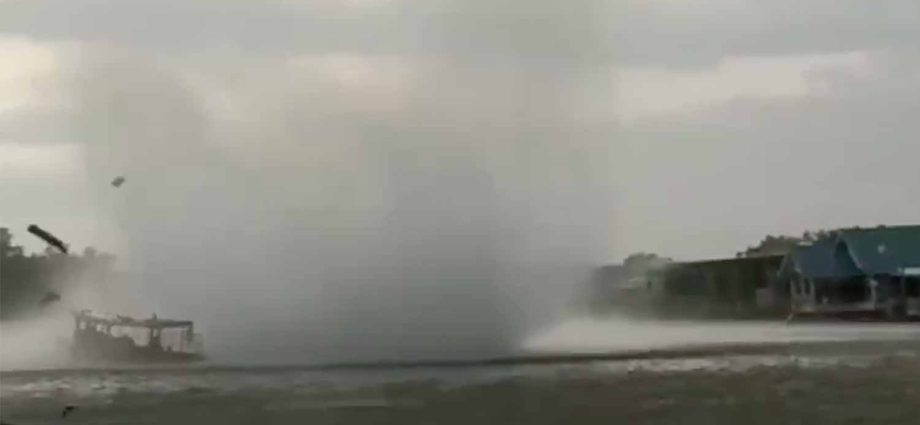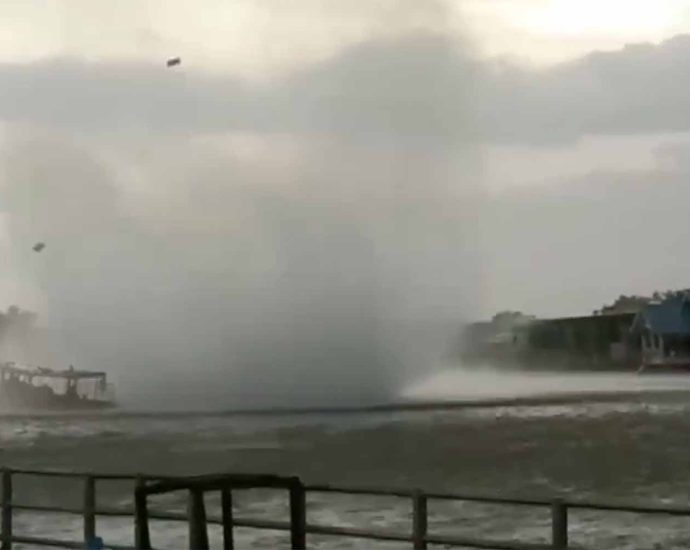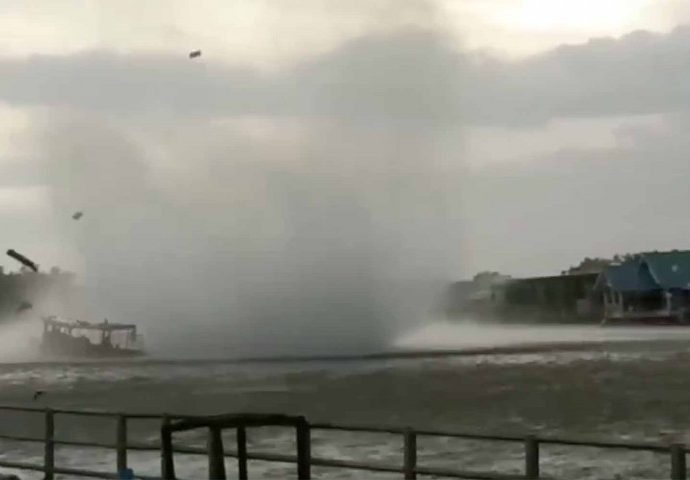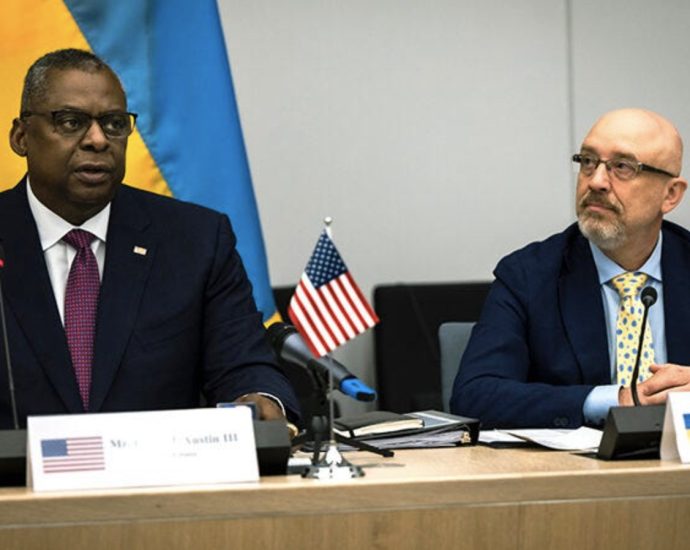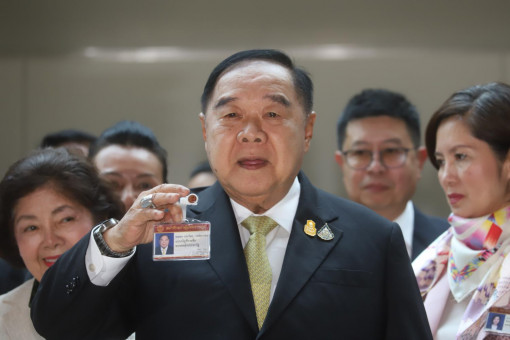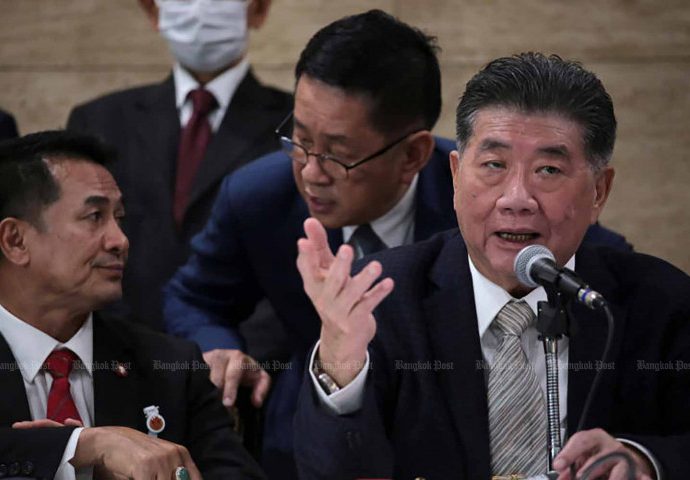Tour boat sinks off Phetchaburi, 1 dead, 1 missing
PUBLISHED : 13 Aug 2023 at 09:48
UPDATED : 13 Aug 2023 at 14:05
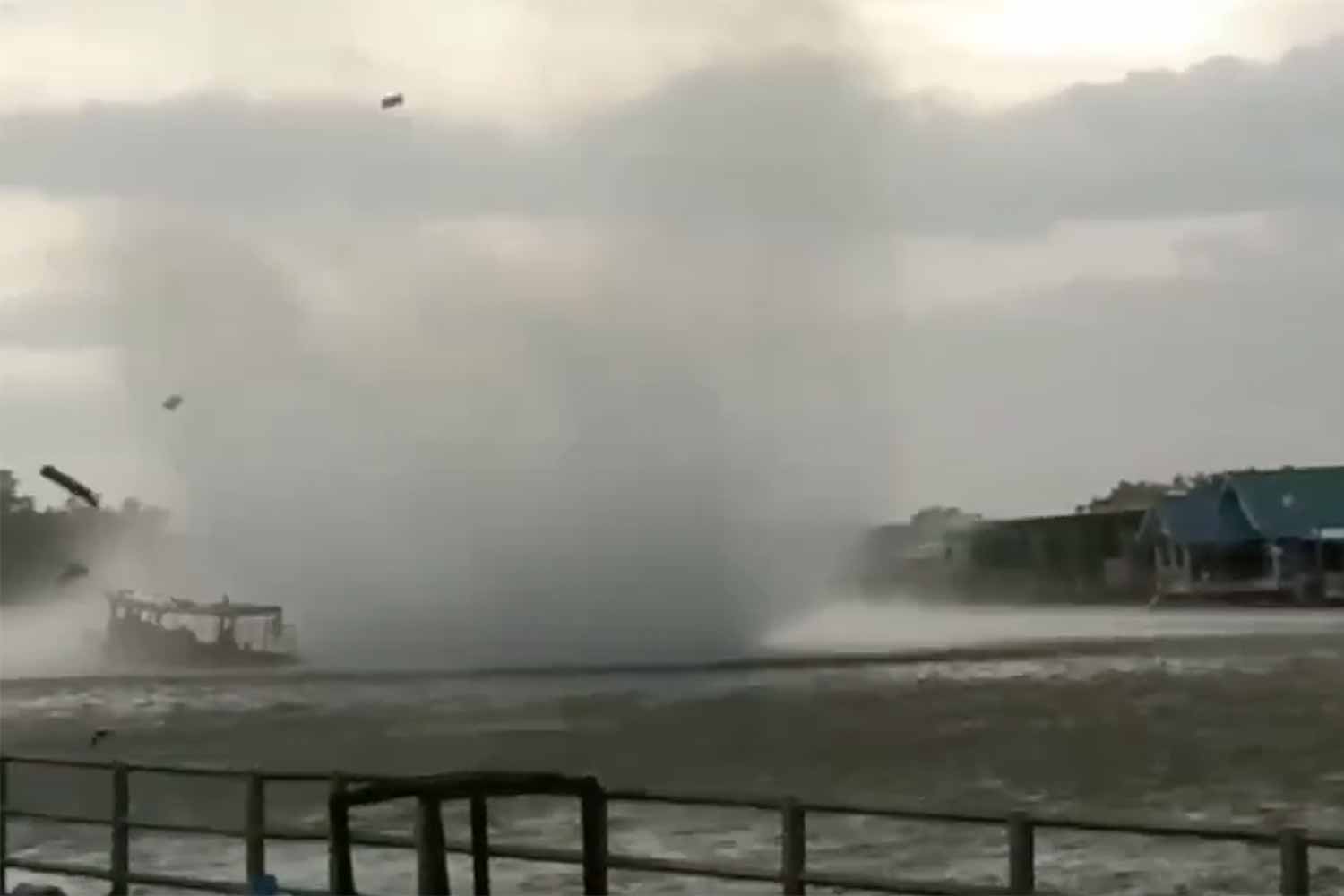
PHETCHABURI: One tourist died and another remained missing after a tour boat was hit by a waterspout and sank in the middle of Bang Ta Boon bay off Ban Laem district on Saturday afternoon.
The incident was reported to the 191 police emergency centre at about 5pm.
The boat was suddenly struck by a waterspout while it was taking seven passengers, all Thais, for a sightseeing excursion around the Ban Ta Boon bay.
After the vessel sank in sight of people on the shore nearby, a rescue unit from the Sawang Sanphet Thammasatan Foundation was despatched to search for those on board. The rescuers managed to pluck four women and a man from the water to safety with only minor injuries, but two remained unaccounted for.
At about 10am on Sunday, the body of a man in his early twenties was found to have washed ashore and was later identified to be of Chanin Chompinthong, one of the missing boat passengers.

A search and rescue team works near where the tour boat capsized, on Sunday. (Photo: Chaiwat Satyaem)
Before the body was found, Sampan Jinping, 63, the boat operator, said the two missing tourists were male, one wearing a Hawaiian shirt and the other a black T-shirt and jeans.
A video clip showing the tour boat being struck by the waterspout was taken by a man who was dining with his family at a restaurant on the shore.
The search for the missing man, also believed to be in his early twenties, was continuing.
Thailand has a poor health and safety track record on the water. Tourist hotspots have seen serious accidents, such as the deaths of almost 50 Chinese tourists in 2018 after their boat capsized off holiday island Phuket.
Tour boat sunk by waterspout off Phetchaburi, 1 dead, 1 missing
PUBLISHED : 13 Aug 2023 at 09:48
UPDATED : 13 Aug 2023 at 13:29

PHETCHABURI: A tourist died and another remained missing after a tour boat was hit by a waterspout and sank in the middle of Bang Ta Boon bay off Ban Laem district on Saturday afternoon.
The incident was reported to the 191 police emergency centre at about 5pm.
The boat was suddenly struck by a waterspout while it was taking seven passengers for a sightseeing excursion around the Ban Ta Boon bay.
After the vessel sank in sight of people on the shore nearby, a rescue unit from the Sawang Sanphet Thammasatan Foundation was despatched to search for those on board. The rescuers managed to pluck five from the water to safety, but two remained unaccounted for.
At about 10am on Sunday, the body of a man was found to have washed ashore and was later identified to be of Chanin Chompinthong, one of the missing boat passengers.
Before the body was found, Sampan Jinping, 63, the boat operator, said the two missing tourists were male, one wearing a Hawaiian shirt and the other a black T-shirt and jeans.
A video clip showing the tour boat being struck by the waterspout was taken by a man who was dining with his family at a restaurant on the shore.
The search for the missing man was continuing.
Tour boat sunk by waterspout off Phetchaburi, 2 missing
PUBLISHED : 13 Aug 2023 at 09:48

PHETCHABURI: Two tourists remained missing after a tour boat was hit by a waterspout and sank in the middle of Bang Ta Boon bay off Ban Laem district on Saturday afternoon.
The incident was reported to the 191 police emergency centre at about 5pm.
The boat was suddenly struck by a waterspout while it was taking seven passengers for a sightseeing excursion around the Ban Ta Boon bay.
The vessel sank and the seven passengers went missing.
A rescue unit from the Sawang Sanphet Thammasatan Foundation was despatched to search for the missing people. The rescuers managed to pluck five from the water to safety, but two remained unaccounted for.
Sampan Jinping, 63, the boat operator, said the two missing tourists were male, one wearing a Hawaiian shirt and the other a black T-shirt and jeans.
A video clip showing the tour boat being struck by the waterspout was taken by a man who was dining with his family at a restaurant on the shore.
The search for the two missing tourists was continuing.
Tour boat hit, sunk by waterspout, 2 missing

PUBLISHED : 13 Aug 2023 at 09:48
PHETCHABURI: Two tourists went missing after a tour boat was hit by a waterspout and sank in the middle of Bang Ta Boon bay off Ban Laem district on Saturday afternoon.
The incident was reported to the 191 police emergency centre at about 5pm.
The boat was suddenly struck by a waterspout while it was taking seven passengers for a sightseeing excursion of the Ban Ta Boon bay.
The vessel sank and the seven passengers went missing.
A rescue unit of the Sawang Sanphet Thammasatan Foundation was despatched for a rescue mission. The rescuers managed to pluck five passengers from the water to safety, but two were still missing.
Sampan Jinping, 63, the boat operator, said the two missing tourists were male, one wearing a Hawaii shirt and the other a black T-shirt and jeans.
A video clip of the tour boat while it was struck by the waterspout was taken by a man who was dining with his family at a restaurant on the shore.
A search continued for the two tourists still missing.
Ground softening for big Russian offensive
It is still too early to say whether the direction of the Ukraine war has changed, but there is increasing evidence that Ukraine’s inability to penetrate Russian defenses along the southern line, and challenges in the directions of Kupyansk, Lyman and Bakhmut suggests the entire war could be reaching a decisive conclusion.
It is, for that reason, that the Biden administration is asking Congress for $20 billion for Ukraine. The idea seems to be to provide psychological support to both President Volodymyr Zelensky and the Ukrainian army.
This time, however, Congress may not rubber stamp this outlandish money request. It is not clear why US$20 billion is needed, and sentiment in the US and Europe is starting to shift toward finding a solution to this costly and difficult war.
Concerns range from depleting US strategic reserves to prolonging a conflict that increasingly looks like it will end up badly in a Ukrainian defeat. While opposition is well short of a majority, further battlefield setbacks could lead Congress to change its mind on financial requests that break the bank.
One thing is certain: It is unlikely that any Washington politician can mobilize public support for the war.
Information about Russian operations, particularly in the Kupyansk direction, is hard to find. The Russians are not calling their operations an offensive, although unconfirmed reports say that Russia has mustered 100,000 or more troops for their operation in this area, and have moved in a lot of heavy equipment.
Most revealing was a convoy of BM-21 multiple rocket launchers, seen heading to the area. There also have been reports of Ukrainian units refusing to fight, and while information on such mutinies has been suppressed, it seems to have happened in the past few days.
Zelensky is hoping to retake Bakhmut, his key objective before he lost the city to Wagner forces. At the moment Bakhmut city is not threatened. Instead, the Ukrainians have been trying to take back settlements to the north and south of the city.
The latest information is that early Ukrainian advances in both directions have been repulsed, and that any hope Zelensky may have of creating a victory on the ashes of Bakhmut seems to have failed to materialize.
The Bakhmut venture, once it is finally sorted out, could create a huge internal problem for Zelensky. He is about to fire his defense minister, the man who fronted for him in getting arms from Europe and the United States. Anticipated replacement candidates are, for the most part, inexperienced and unconnected to the war.
Oleksiy Reznikov, the sitting defense minister, may be tipped to be sent to the UK as the Ukrainian ambassador. No one can say for sure whether Ukraine’s military still supports Zelensky, but as more and more cracks appear in Kiev, it is a good bet that they may take matters into their own hands. Should that happen, Zelensky will likely be deposed.

Ukraine has brought up reserve units, many NATO-trained, to try and head off any big Russian advance.
But committing these reserves leaves Ukraine with less trained brigades for the future, since Russia’s primary strategy has been to let them come in fairly close and then pound them with artillery, air strikes and aerial mines. It is now reported that Ukraine has ordered a mass evacuation, while at the same time mining bridges and roads to slow a Russian advance.
The Russians have been fairly clever in managing their war front. Few attacks have been made on Kiev, except one more than a month ago on Ukraine’s intelligence center in the city.
Little is said in the Russian press about the top Ukrainian commanders, Valerii Zaluzhny and Oleksandr Syrskyi, other than to note that the Ukrainian army operates professionally. This may suggest the Russian door is open to dialogue with Ukraine’s military.
Meanwhile, reports indicate that the Wagner troops in Belarus are starting to return to Russia. The immediate cause is that Belarus has refused to pay them, leaving them without salaries for their troops or money to purchase equipment.
It is possible that some of them will be shipped off to Africa. While Russia has not supported the coup in Niger, that disclaimer does not necessarily apply to Wagner. The recent decision of ECOWAS to agree to putting together a military operation to “restore democracy in Niger,” offers Russia and Wagner a significant opportunity.
ECOWAS troops are nearly as bad as Niger’s. They lack transport, communications and supplies. Any war there, without an outside stabilizing force, is likely to become a war of atrocities. No one knows whether Putin will tip his hat to Wagner leader Yevgeny Prigozhin and fly them into Niamey.
Niger, of course, is a sideshow and Ukraine is the main event, with significant geopolitical implications. The Russians have been holding out instead of starting a big push to finish the war, trying to wear down the Ukrainians and split support for the war in Kiev.
But war planners in Moscow know how to count, and it could be they now see opportunities for a big offensive. If it materializes, keep an eye on Kupyansk.
Stephen Bryen is a senior fellow at the Center for Security Policy and the Yorktown Institute. This article was originally published on Weapons and Strategy, his Substack. Asia Times is republishing it with permission.
Prawit not quitting politics just yet, ‘willing’ to accept new govt post
PUBLISHED : 13 Aug 2023 at 08:04
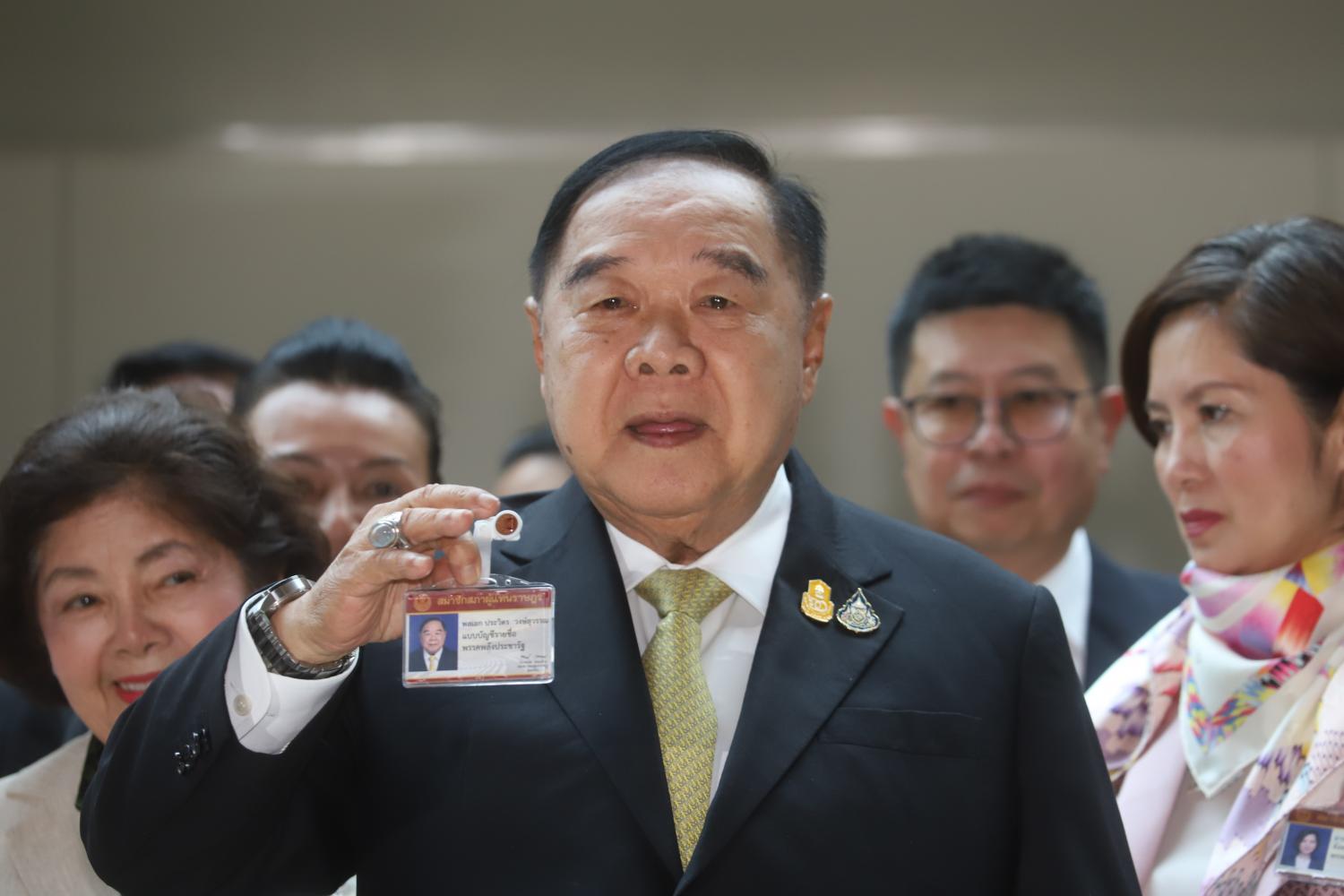
Deputy Prime Minister and Palang Pracharath Party (PPRP) leader Gen Prawit Wongsuwon is not leaving politics just yet and has never knocked back the prospect of a post in the next government, deputy PPRP leader Chaiwut Thanakamanusorn said.
Mr Chaiwut, who serves as Digital Economy and Society Minister, was speaking following a report the PPRP would join a coalition government led by the Pheu Thai Party.
According to a source, Pheu Thai has now sealed a deal with the PPRP and the party has agreed to vote for Pheu Thai’s prime ministerial candidate in exchange for slices of the cabinet quota cake.
The source said the Pheu Thai-led coalition would be down to 278 MPs from the previous 315 MPs reported on Friday as the United Thai Nation Party has not yet confirmed its support.
Asked whether Gen Prawit would accept any cabinet post in the Pheu Thai-led coalition government after a report surfaced that he would let his younger brother Pol Gen Patcharawat Wongsuwon, the PPRP’s chief adviser, take a cabinet post instead, Mr Chaiwut said: “[Gen Prawit] never said he would not accept a post.” Mr Chaiwut said Gen Prawit remains the party’s leader and PM candidate.
Quizzed about Phai Lik, a PPRP MP for Kamphaeng Phet, who earlier said PPRP’s 40 MPs would vote for Pheu Thai’s PM candidate, Mr Chaiwut said that was the opinion of some MPs. Mr Chaiwut said the party will meet to decide whether to join the Pheu Thai-led coalition.
Deputy UTN leader Thanakorn Wangboonkongchana also said on Saturday that the party will meet on Tuesday to discuss whether it will take part in the coalition.
Hoping for better days

The business sector says Thailand’s tourism has not reached its peak. Many say the complicated tourist visa application process, criminal activities and delays in the formation of the next government have discouraged tourists.
Chaiyapruk Thongkam, president of the Association of Domestic Travel, said a lull in the sector expected in the second half of this year would result in similar tourist numbers as H1, due to intractable factors such as natural disasters and unstable politics.
In terms of numbers, the Association of Thai Travel Agents (ATTA) found that during the first seven months of the year, Thailand welcomed 1,935,241 Chinese tourists. ATTA forecast the number of Chinese tourists might not reach the target of 5 million set for the year but rather reach 4.2-4.5 million Chinese visitors instead.
“The exhausting process of establishing a new government might be followed by protests. Plus, tourism agencies will have to rely on the next government to finalise the annual budget,” Mr Chaiyapruk said.
“If the government comes together quickly, we will be able to prepare tourism campaigns for the country,” he added. The number of domestic tourists at the moment is only 50-60% of the estimated total for the high season, running from October this year to April next year.
“If we were subsidised by the government, we would design programmes to take tourists to visit small or regional cities and offer guides for cross-provincial trips,” Mr Chaiyapruk added.
Targeting short-haul tourists
The caretaker government has tried to attract long-haul tourists from Europe, the United States and the Middle East as they tend to stay longer and have more spending power.
Mr Chaiyapruk said that in his view, Thailand should focus on attracting more tourists from countries in Asia, such as Japan.
“We should focus more on countries where air travel is convenient, especially Japan. Thailand has yet to become a top destination for Japanese tourists so we should try penetrating their market,” Mr Chaiyapruk said.
Meanwhile, domestic tourism has slowed due to demand for international flights. Air carriers are shifting their domestic planes to international routes to cater to foreign travellers.
When asked about the number of Chinese tourists after China reopened after Covid-19 earlier this year, Mr Chaiyapruk said the number of tourists from this source has fallen short of target.
One notable issue is that Chinese tourists find it hard to apply for Thai tourist visas. Many say visas on arrival take too much time and cost more than they did before the Covid-19 pandemic.
Plus, immigration services at train stations along the Thai border are not fully functional, which costs Chinese tourists on high-speed trains both time and money. The trains now connect China and Laos.
As a result of these problems, many have switched to visiting Vietnam where the immigration process is less complicated and travel facilities more amenable, said Mr Chaiyapruk.
“The government should hold talks about visa exemptions under bilateral agreements. The policy should be loose enough to encourage international tourists to visit Thailand,” he said.

Chaiyapruk Thongkam, president of the Association of Domestic Travel
On Aug 10, the government further relaxed its tourist visa requirements and shortened the standard time required for approving visas for Chinese visitors to make the process easier.
Under the new requirements, Chinese visitors are only required to submit just six documents along with their visa application.
These are their passport, three photos, an air ticket, a document showing where they are staying, a document certifying their permanent residence, and financial statements, says deputy government spokeswoman Rachada Dhnadirek.
This will also soon halve the application process to seven working days.
Islands still popular
Ratchaporn Poonsawat, chairman of the Tourism Association of Koh Samui, said most visitors to Koh Samui are from European countries and make up 80-90% of hotel occupancies.
He added that two full-moon parties will take place this month, which are likely to draw tourists to Koh Samui and Koh Phangan until September.

Ratchaporn: ‘Safety still a concern’
Earlier this month, the shocking news of a Colombian plastic surgeon being murdered by his boyfriend put Koh Phangan in the spotlight again.
Mr Ratchaporn said the murder stemmed from personal issues between the couple and would not affect the overall tourism situation.
He said safety issues concern tourists more, such as ferry and pier safety standards and the risk of road accidents.
“Thailand is still ranked as one of the countries with the most road accidents and many tourists ignore traffic rules,” said Mr Ratchaporn.
Locals and entrepreneurs in Koh Samui and Koh Phangan are aware of the importance of safety.
Mr Ratchaporn said the recent murder of the Colombian surgeon was quickly solved and police made sure the legal process was transparent.
Nonetheless, many are concerned that crime in Thailand will affect the country’s tourism image.

Slowly but surely: People arrive at Suvarnabhumi airport which has recorded a steadily increasing number of international arrivals.
Ensuring tourist safety
Pol Lt Gen Sukhun Prommayon, commissioner of the Tourist Police Bureau, admitted that murders among foreign tourists in Thailand are difficult to prevent for they tend to be personal matters.
While street crimes still concern locals and tourists, the crime rate has dropped as police regularly patrol around popular tourist areas.
Police also work with local entrepreneurs to solve scams targeting foreign tourists. “I do not believe crimes in Thailand are pushing tourists away,” Pol Lt Gen Sukhun said. He said vigilant civilians can help police learn about local crimes.
Pol Lt Gen Sukhun said the declining number of Chinese tourists coming to Thailand might also be because of the Chinese economy and false information released to make tourists nervous.
“[Police] are working to battle fake news spreading among Chinese tourists who are interested in a holiday in Thailand.
“The news said they would be held hostage for a ransom or ripped off in scams where people have their organs harvested, which is just false,” said Pol Lt Gen Sukhun.
Now the visa application process has eased, the number of Chinese travellers should increase by the end of this year, he predicted.

Sukhun: ‘Fake news puts people off’
Britain’s Prince Harry saddles up for Singapore charity polo game
SINGAPORE: A smiling Prince Harry saddled up for a charity game of polo in Singapore on Saturday (Aug 12). The Duke of Sussex’s team Royal Salute Sentebale took on the Singapore Polo Club, with Argentinian polo legend and close friend of Harry’s, Nacho Figueras, turning out for the home sideContinue Reading
Critics slam Pheu Thai’s ‘betrayal’
‘Uncle’ parties likely to join govt
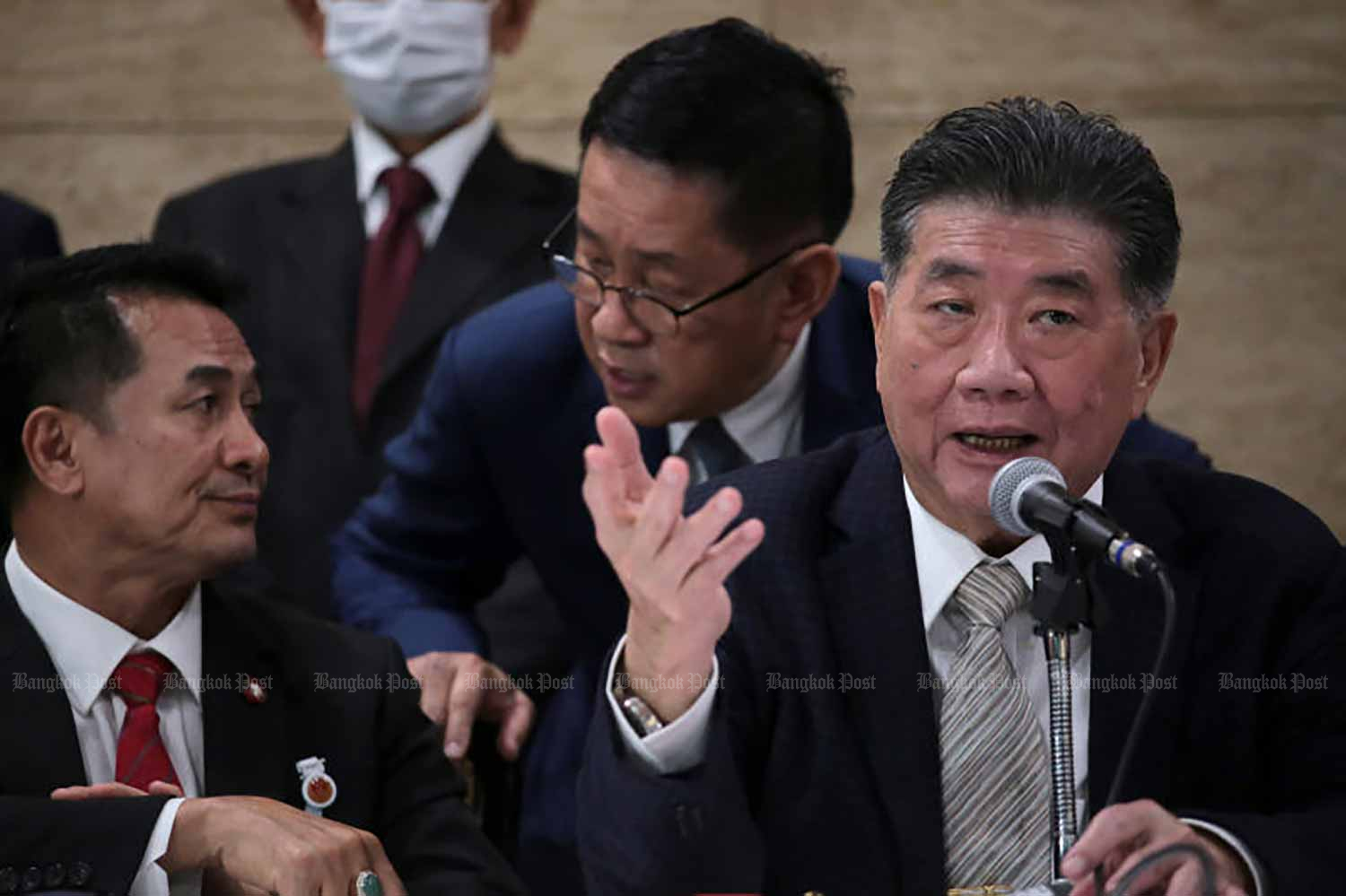
Critics have slammed the Pheu Thai Party over its attempt to bring the so-called uncle parties into its coalition, accusing the party of betraying the people.
They said the make-up of the Pheu Thai-led coalition government will be no different from the outgoing government as only Pheu Thai will serve as a new addition.
Pheu Thai is coming under heavy criticism for reneging on its word before the May 14 election that it would not work with the “uncle” parties, referring to those linked to military leaders involved in the 2014 coup.
The “uncles” refer to Prime Minister Prayut Chan-o-cha, the former United Thai Nation Party (UTN) chief adviser and its prime ministerial candidate, and Deputy Prime Minister Prawit Wongsuwon, the leader and prime ministerial candidate of the Palang Pracharath Party (PPRP).
According to a source, Pheu Thai has now sealed a deal with the PPRP in which the PPRP has agreed to vote for Pheu Thai’s prime ministerial candidate in exchange for slices of the cabinet quota cake.
However, the UTN has not yet confirmed whether it will join the coalition. If the UTN also agrees to join, the Pheu Thai-led coalition will boast 315 MPs, the source said.
Pheu Thai has 141 MPs while Bhumjaithai has 71 MPs, the PPRP 40, the UTN 36, Chartthaipattana 10, Prachachat 9, Pheu Thai Ruam Palang 2, Chartpattanakla 2, with Seri Ruam Thai Party, Plung Sungkom Mai, Thongthee Thai and the New Democracy Party all having one MP each.
Wanwichit Boonprong, a political science lecturer at Rangsit University, said the PPRP and the UTN are Pheu Thai’s old foes.
”If they work together, people may suspect that they do so for the sake of their own interests regardless of how their supporters feel,” Mr Wanwichit said.
”If they join hands, they will find it hard to work together. Pheu Thai cannot expect to have a free hand in handling economic affairs as it wishes because the two parties will want to have a share.
“It will be difficult for Pheu Thai to implement several of its policies. As a result of its decision to bring the uncle parties into the coalition, votes for Pheu Thai are likely to decline at the next election,” Mr Wanwichit said.
Olarn Thinbangtieo, a political science lecturer at Burapha University, echoed the view, saying Pheu Thai had previously said it would not work with the UTN and the PRRP.
If it goes back on its word, it can expect to see people take to the streets, and if demonstrations persist, the economy will be affected, he said.
Wiroj Lakkhanaadisorn, a Move Forward Party (MFP) list-MP, tweeted that the configuration of the Pheu-Thai led coalition will be no different from that of the outgoing government if the UTN and PPRP join it.
“Another party comes as a new addition and only serves to provide support for a dictatorship,” Mr Wiroj tweeted, apparently referring to Pheu Thai.
Amarat Chokepamitkul, a key figure of the MFP, also posted on Facebook: “The people will not get any new government. It is only the previous government, with Pheu Thai added to it.”
Ekachai Hongkangwan, a red-shirt activist, said red-shirt supporters have made sacrifices to oppose illegitimate powers, and called on Pheu Thai not to betray them by working with parties that support a dictatorship.
Former red-shirt guard chief Sombat Thongyoi posted on Facebook that no matter how red-shirt groups protest, this could not stop Pheu Thai from forming a coalition government including the PPPR and UTN.
Meanwhile, Pol Maj Gen Jirasant Kaewsaeng-ek, deputy commissioner of the Metropolitan Police Bureau (MPB), on Saturday warned road users to avoid Sunday’s “car mob” rally.
A convoy of cars will start from BTS Mor Chit station and proceed to the headquarters of the Bhumjaithai Party and Pheu Thai, he said.
Unusual hotels and food in Japan: From heritage ryokan to Hida beef, Miyajima oysters and Kanazawa curry

Like many Singaporeans, my family loves visiting Japan. I’ve been to Japan eight times but mostly stuck to Tokyo. This time, travelling with my teenage son in June, we ventured further – to five different cities.
One reason was because we were already buying a 14-day JR Pass (47,250 yen or S$459 at press time; a seven-day pass costs 29,650 yen; a 21-day pass 60,450 yen), which allows unlimited travel on all local and high-speed trains throughout Japan. Come October 2023, prices will increase by at least 65 per cent, so we decided to make our money’s worth during our trip.
Japan is split into eight regions but to cut down on travelling time, we skipped Hokkaido (northern Japan) and Kyushu (far south). Landing in Tokyo in the morning, we hopped onto our first Shinkansen to Takayama via transit at Nagoya.
Takayama, because of its well-preserved Edo-period historical centre – and because we wanted to eat its famous Hida beef. We also wanted to visit the UNESCO World Heritage site of Shirakawa-go, renowned for its unique Gassho-zukuri architecture and a 50-minute bus ride away.

